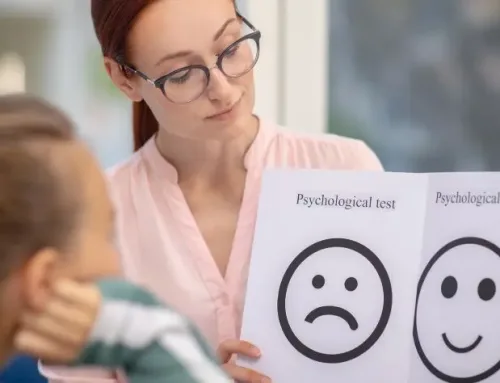Can You Get a PsyD with a Masters in Counseling? Admission Paths Explained

Can you get a PsyD with a master’s in counseling? Yes—and for many experienced clinicians, it is the next strategic step in their career. If you already have a foundation as a mental health professional and are looking to expand your clinical expertise, take on greater leadership, or move into academic and administrative roles, a Doctor of Psychology will support that professional growth and your career opportunities.
Already Have a Counseling Degree? A PsyD Could Be Your Next Step
Many professionals holding a master’s in counseling (MA, MS, or MEd) consider a PsyD is an option. These degrees are widely accepted as strong academic foundations for Doctor of Psychology programs. If you have completed graduate-level training in counseling and have worked in the field, you are already on a track that aligns with what many PsyD programs are looking for.
Counseling degrees often include essential coursework in clinical theory, ethics, and therapeutic practice, making them ideal stepping stones. Programs recognize this and consider your previous education as an indicator of your academic commitment and your readiness for advanced, doctoral-level study.
Why Counselors Choose the PsyD
A large portion of PsyD applicants come from counseling backgrounds. Licensed Marriage and Family Therapists (LMFTs), Licensed Professional Counselors (LPCs), school counselors, and similar professionals often pursue a PsyD to expand their scope of practice and deepen their clinical expertise.
Some are particularly drawn to advanced roles in supervisory, educational, and administrative positions. Others recognize their theoretical and technical limitations; they seek to engage with their clients on a deeper level, strengthened by in-depth theory and an expanded skill set to work with more complexity and challenging cases. What they share is a desire to evolve professionally and stay grounded in the work they already know and do.
Your Clinical Experience Is a Strength
Your time working in the field is a core part of your value as an applicant. Most PsyD programs welcome students who already have real-world experience with clients. Whether you have been in private practice, school or hospital settings, community agencies, or clinical programs, your hands-on work matters.
Here’s how clinical experience supports your PsyD path:
- It demonstrates that you have applied therapeutic theory in real-life settings.
- It indicates that you can engage with complex emotional and relational dynamics.
- It gives you a meaningful foundation for doctoral-level case discussion and integration.
- It reflects a professional maturity that contributes to a rich academic environment.
What PsyD Programs Typically Require
Before applying to a Doctor of Psychology program, it’s important to understand that the schools’ admissions committees are looking for candidates who can demonstrate academic readiness, clinical experience, and a commitment to the field.
PsyD admission requirements often include:
- A regionally accredited master’s degree in a mental health or closely related field
- A competitive graduate GPA (generally 3.0 or higher)
- A statement of purpose or personal essay outlining goals and experience
- An interview with faculty or an admissions committee
These requirements help programs assess a candidate’s preparation, their clarity of purpose, and professional potential in doctoral-level work.
Accepted Academic Backgrounds
PsyD programs typically welcome applicants from a range of graduate-level clinical fields. While a master’s in psychology may seem like the most direct path, many students enter with degrees in counseling, marriage and family therapy, social work, or other mental health disciplines.
What matters most is that your academic background has prepared you to think critically about mental health, understand clinical frameworks, and engage in therapeutic work. If your degree aligns with that foundation—whether it’s an MA in Counseling or an MSW—it’s likely to be considered a fit.
Clinical Experience and Additional Preparation
Some PsyD programs give preference to applicants who already have clinical experience. This might include work as a therapist, counselor, case manager, or other mental health professional. Time spent in applied roles helps strengthen your application by showing that you engaged directly with clients, teams, or communities.
In addition, a small number of programs may request that applicants have completed specific graduate-level coursework, such as psychological assessment or diagnostic training. If you have taken courses like these—or have substantial applied experience in those areas—it can help demonstrate your readiness for advanced doctoral work.
Is a PsyD Right for Your Background?
Doctor of Psychology (PsyD) programs welcome applicants from a wide variety of clinical and behavioral science fields. While many students hold degrees in psychology, others come from counseling, marriage and family therapy, social work, or school-based mental health programs. What connects them is a shared foundation in clinical practice and a drive to continue growing.
These graduate programs often attract professionals who already have significant field experience and who are seeking deeper expertise. PsyD cohorts tend to reflect that diversity, with students bringing insights from different modalities, disciplines, and settings.
Common degree backgrounds include:
- Counseling (MA, MS, or MEd)
- Marriage and Family Therapy (MFT)
- Social Work (MSW)
- School Psychology or Educational Psychology
- General or Clinical Psychology (BA/BS or MA/MS)
A master’s degree in counseling offers a strong starting point for doctoral-level study. These programs are typically rich in applied training, clinical ethics, and human development. Graduates often enter PsyD programs already grounded in therapeutic frameworks, clinical judgment, and client care.
This clinical foundation aligns well with the structure of a PsyD, which is designed to deepen and refine practice, rather than introduce it from the beginning. Many applicants with a counseling background find that they’re well-prepared to step into doctoral-level coursework and to engage critically with more advanced psychological material.
What PsyD Training Adds to Your Experience
The PsyD builds on your clinical background by expanding both depth and scope. Through coursework, case discussion, and applied learning, students are introduced to more complex theoretical material and broader frameworks of care.
PsyD programs often emphasize:
- Advanced theory and psychodynamic understanding
- Psychological and developmental assessment
- Integration of clinical work into a broader psychological framework
- Skills for leadership, teaching, supervision, and advocacy
For many experienced clinicians, this training offers the opportunity to grow into roles that extend beyond direct practice—whether as educators, administrators, program directors, or thought leaders in the mental health field.
The SCUHS PsyD Program: Building on Your Experience
At Southern California University of Health Sciences (SCUHS), we have designed our Doctor of Psychology (PsyD) in Psychodynamic Psychology) program with experienced clinicians in mind. Whether you are a counselor, therapist, or mental health professional with a graduate degree, this program helps you advance to the next level in your career.
Our accelerated 3.3-year format blends flexible online learning with immersive in-person coursework. With a focus on psychodynamic theory, child development, relational psychotherapy, and neuroscience, we support your growth into a more confident, capable, and reflective professional.
If you would like to learn more, schedule a virtual information session. You can also reach out to us anytime at admissions@scuhs.edu.
How Licensure May Be Affected by Your Master’s in Counseling
Earning a Doctor of Psychology (PsyD) can expand your clinical and professional reach, but it does not automatically grant you a license to practice as a psychologist. Licensure as a psychologist is managed at the state level and typically involves several post-degree steps, including documentation of completed supervised clinical experience and passing a national examination.
Every state has its own licensing board, and requirements do vary. In California, psychology licensure is overseen by the Board of Psychology. To become a licensed clinical psychologist, applicants must have earned a qualifying doctoral degree, complete 3,000 hours of supervised professional experience (at least 1,500 of which must be postdoctoral), and pass both the Examination for Professional Practice in Psychology (EPPP) and the California Psychology Laws and Ethics Examination (CPLEE). While APA accreditation is not required, the doctoral program must meet specific educational standards set by the state.
Factors That May Affect Licensure
If you are entering a PsyD program with a background in counseling, your path to psychologist licensure may depend on several factors. These include the nature of your PsyD program and how your training aligns with state board requirements.
Licensure eligibility may be influenced by:
- Whether your PsyD program is accredited (e.g., by the APA or a recognized regional body)
- The number and type of supervised clinical hours completed during or after the doctoral program
- State-specific laws and regulations governing psychologist licensure
- Whether your doctoral education covers assessment, diagnosis, and psychological testing
- Documentation of completed specific coursework (such as suicide assessment and prevention) either in your doctoral program or outside of it
Before pursuing licensure, it’s important to research the state where you intend to practice and seek the information directly from the licensing board. Many professionals also consult with academic advisors or licensure specialists during their doctoral program to plan accordingly.
Why Many Counselors Choose a PsyD
Professionals with counseling degrees often pursue a PsyD for reasons that go beyond the interest in becoming a licensed psychologist. The degree can serve to fulfill a lifelong dream, it enhances reputation and becomes a powerful tool for professional development, allowing clinicians to refine their expertise, strengthen their theoretical base and scholarly background, and opens new career opportunities.
Many licensed counselors use the PsyD to:
- Expand the scope and depth of private practice
- Develop specialization in advanced modalities such as psychodynamic psychotherapy and in serving specific populations
- Supervise interns, associates, or junior clinicians
- Practice of consultations for individuals, groups, organisations
- Transition into academic, training, or faculty positions
- Lead programs, departments, facilities, agencies, or clinics
Whether or not you intend to pursue licensure as a psychologist, earning a PsyD can support long-term goals in leadership, education, and clinical excellence.
The Doctoral Program for Counselors: SCUHS PsyD
At SCUHS, our Doctor of Psychology (PsyD) program is a great fit for clinicians who are already grounded in clinical work. If you hold a master’s degree in counseling, marriage and family therapy, social work, or a related mental health field, this program is designed to support your next phase of professional growth.
The program accepts a wide range of academic backgrounds and welcomes applicants who bring real-world experience into their doctoral studies. You’ll continue to work in your current role while integrating new theory, expanding your clinical insight, and preparing for leadership.
What makes SCUHS a strong fit:
- Accepts degrees in counseling, MFT, social work, psychology, and more
- Structured around clinical integration in your current practice
- Emphasizes psychodynamic theory, developmental psychology, neuroscience, trauma informed care, whole health and integrative medicine
- Delivered in a 3.3-year hybrid format: online coursework + immersive intensives
Helping You Move Forward with Confidence
Whether your goals include clinical leadership, program direction, academic teaching, or supervisory or training roles, the SCUHS PsyD supports that progression. The curriculum is focused and grounded in our integrative health philosophy—recognizing the connections between physical, mental, and emotional health.
Our program is led by Dr. Jens Schmidt, a clinician, educator, and expert in psychodynamic psychotherapy. Under his leadership, students gain access to advanced clinical training and close mentorship in a community of a faculty of scholar-practitioners who bring their rich and diverse experience to the classroom.
You will also find financial aid options and scholarship opportunities to support your path forward. If you’re ready to take this next step, we’re here to help you move with clarity and purpose.
Bring Your Clinical Expertise to the Doctoral Level
A master’s degree is a great foundation for meaningful, advanced work in the mental health field. Earning a Doctor of Psychology (PsyD) builds on that base, deepening your clinical insight, expanding your leadership potential, and positioning you to influence systems, educate others, and grow professionally.
At Southern California University of Health Sciences, we have created a PsyD program that respects the professional experience you have gained and builds on it, so that you can reach the next level of your career with intention. If you thrive to evolve in your role, sharpen your skills, and lead with clarity, we invite you to take the next step. Apply now, schedule a virtual information session, or email us at admissions@scuhs.edu to get in touch.
FAQs
Can you get a PsyD with a master’s in counseling?
Yes, you can pursue a PsyD with a master’s in counseling. Many programs not only welcome but seek applicants with a background in counseling,marriage and family therapy (MFT), and social work. Your clinical experience and graduate-level training are viewed as assets that prepare you for doctoral studies in psychology. Programs look for a solid academic foundation, relevant professional experience, and a clear commitment and passion to thrive in the mental health field.
What’s the difference between a PsyD and a PhD in psychology?
A PsyD focuses more on clinical training and applied practice, while a PhD emphasizes research and academic scholarship. PsyD programs are often geared toward experienced clinicians who want to deepen their practice or move into leadership roles. PhD programs are ideal for those interested in research-focused careers or teaching in traditional academic settings and scholarship. Both are highly regarded doctoral degrees, but they serve different career goals.
Does a PsyD lead to psychologist licensure?
A doctoral degree (PsyD or PhD in Psychology) is an essential requirement on the path towards becoming a licensed psychologist, but licensure is not automatic. In order to become licensed and be permitted to independently practice in a state, you must meet that state’s specific licensing requirements, which usually include the completion of a verified supervised clinical experience (clinical hours) and passing the EPPP exam. If licensure is your goal, it is essential that you research and familiarize yourself with your state board’s regulations and requirements for licensure and choose a program that aligns with those standards.
What kind of career paths do PsyD graduates usually pursue?
PsyD graduates often move into leadership roles in clinical settings, become supervisors, open or expand private practices, or teach in graduate programs. Some focus on specialization such as psychodynamic psychotherapy, trauma work, child and adolescent mental health, psychodiagnostic testing, neurodiversity, or the work with specific populations. The degree supports both depth in clinical work and broader roles in the field, from administration to education and advocacy.
Who is a strong fit for the PsyD program at SCUHS?
Our program is specifically aimed at professionals who hold a master’s in a behavioral health field—counselors, MFTs, social workers, and related mental health professionals. If you are looking to deepen your practice, step into leadership, or transition into academic roles, you’ll find a structure that supports your goals while honoring the work you’re already doing.
Related Posts




